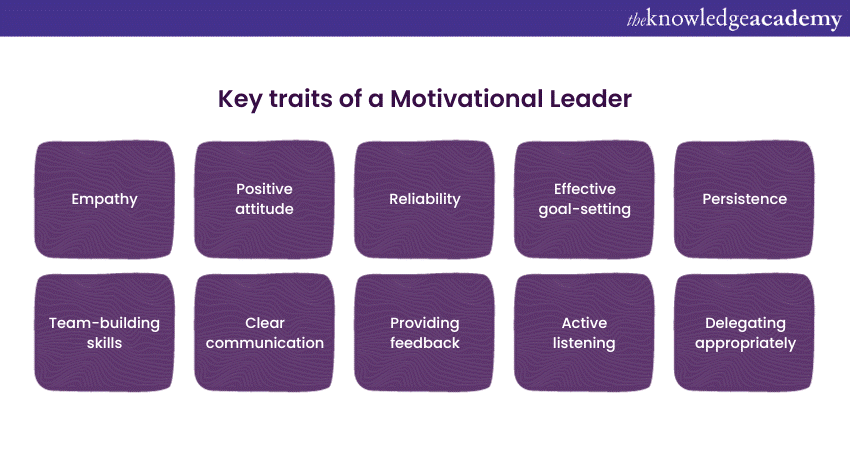We may not have the course you’re looking for. If you enquire or give us a call on 01344203999 and speak to our training experts, we may still be able to help with your training requirements.
Training Outcomes Within Your Budget!
We ensure quality, budget-alignment, and timely delivery by our expert instructors.

Motivational Leadership is about sparking real, impactful change in teams and businesses. Imagine a leader who doesn’t just tell you what to do but inspires you to give your best, recognises your efforts, and really cares about your growth.
That's what Motivational Leadership is all about! It's a journey where leaders and teams move forward together, turning hurdles into stepping stones by staying motivated and positive. In this blog, we'll explore why Motivational Leadership is a game-changer and dive into practical tips to light that motivational fire within a team. Let’s get started!
Table of Content
1) What is Motivational Leadership?
2) Why is Motivational Leadership so important?
3) What are Motivational Leadership skills?
4) 10 Motivational Leadership techniques
5) Conclusion
What is Motivational Leadership?
Think of Motivational Leadership as the coach behind a winning team. It's more than just telling people what to do; it's about inspiring and driving them to give their best. Motivational leaders don't just set the direction; they fuel passion, encouraging each team member to bring their A-game. They create an environment where people feel valued, heard, and excited about their work. In essence, Motivational Leadership is the art of leading with a mix of enthusiasm, empathy, and encouragement, making sure that everyone is not only on the same page but also excited to turn to the next one!
Ready to explore the world of Personal Development? Explore our comprehensive Career Development Masterclass course today!
Why is Motivational Leadership so important?
Here’s why Motivational Leadership is a game changer for teams and businesses:
1) Boosting morale: Motivational Leadership uplifts team spirit and enhances collective morale, ensuring a positive and energising work atmosphere.
2) Employee retention: When leaders motivate and value their team, members are more likely to stay, reducing turnover and retaining talent.
3) Navigating change: Motivational leaders effectively guide teams through change, ensuring adaptability and maintaining performance levels amidst transitions.
4) Facilitating innovation: By inspiring team members, leaders pave the way for innovative thoughts and actions to flow freely within the organisation.
5) Enhancing productivity: Teams driven by Motivational Leadership tend to exhibit heightened productivity as they are encouraged and inspired to give their best.
6) Building culture: A strong, positive organisational culture is often sculpted by leaders who motivate, respect, and engage with their teams meaningfully.
7) Conflict resolution: Motivational leaders can effectively manage and resolve conflicts by keeping the team aligned and valuing each member’s perspective.
8) Customer satisfaction: Happy, motivated teams often translate to excellent customer service and client interactions, boosting satisfaction rates.
9) Achieving goals: Teams led by motivational leaders are often more aligned and driven towards achieving organisational objectives efficiently.
10) Professional development: Such leadership often emphasises the growth and development of team members, ensuring continuous learning and advancement.
What are Motivational Leadership Skills?
Motivational Leadership isn’t about a single skill or action. It's a mix of abilities and traits that blend to uplift, inspire, and drive a team to success while ensuring a positive, enthusiastic working environment.
Here are some pivotal skills that a motivational leader often has in their toolbox:

1) Empathy: Tuning into team members' feelings and needs is key. Empathy is all about understanding and sharing feelings with others.
2) Positive attitude: Keeping things optimistic, even when the chips are down, provides a safety net of positivity for the entire team.
3) Reliability: Being someone the team can count on in various scenarios solidifies the trust within.
4) Effective goal-setting: Crafting achievable, clear, and impactful goals helps steer the team in the right direction.
5) Persistence: Holding firm, especially during challenges, showcases strength and dedication to the team.
6) Team-building skills: Fostering a united, collaborative environment where everyone pulls together is crucial.
7) Clear communication: Transparent, regular, and effective communication ensures everyone is on the same page.
8) Providing feedback: Constructive criticism and acknowledgement keep individuals aligned with their objectives and growth.
9) Active listening: Ensuring team members are heard and understood validates their contributions and insights.
10) Delegating appropriately: Trusting team members with responsibility demonstrates faith in their capabilities and fosters professional growth.
Ready to dive into the world of Personal Development? Explore and learn from our Personal Development Training now!
10 Motivational Leadership techniques
Motivational Leadership goes beyond just managing people; it involves inspiring and enabling them to achieve their full potential and aligning their efforts with organisational objectives. So, let’s take a deep dive into ten techniques that carve out motivational leaders, shaping both their teams and organisational cultures in constructive, positive ways.
1) Empathy
Empathy is the backbone of Motivational Leadership. The ability to understand and share the feelings of others is vital. Leaders should create a supportive environment where team members feel heard and understood. Embrace open-door policies and encourage team members to share their thoughts, concerns, and aspirations, validating their experiences and enhancing interpersonal relationships within the team.
2) Positivity
Maintaining a positive outlook, even during challenging times, is pivotal. Leaders should exhibit an optimistic demeanour, celebrating successes and finding solutions during setbacks. A positive environment fuels motivation, encourages team members to take constructive risks and fosters a can-do attitude that is contagious within organisational settings.
3) Reliability
Being a reliable leader means being consistent and dependable. Your team should know that they can count on you for support, guidance, and to keep promises. By acting reliably, leaders build trust and create a stable and safe working environment where team members feel secure to explore, innovate, and perform to their best abilities.
4) Goal setting
Crafting clear, achievable, and challenging goals can steer the team towards success. SMART goals (Specific, Measurable, Achievable, Relevant, and Time-Bound) offer a structured approach to setting objectives, providing clear direction and a sense of purpose. Celebrating milestones and acknowledging contributions along the way enhances motivation and keeps the team focused and engaged.
5) Persistence
Leaders should exemplify persistence, maintaining focus and determination in the face of challenges. Demonstrating resilience and commitment to goals serves as a model for the team, inspiring them to persist and strive amidst obstacles. Provide resources and support to help team members navigate through difficulties while maintaining a steady drive toward objectives.
6) Team building
Nurturing a cohesive team enhances collective efficacy and satisfaction. Engage in team-building activities, create opportunities for collaboration, and foster a sense of unity. Appreciating diversity and facilitating inclusive practices ensures that each member feels valued and recognised, strengthening the team's collaborative spirit.
7) Communication
Transparent and effective communication is key to keeping everyone aligned and motivated. Regular updates, acknowledging efforts, and providing clear instructions ensure that team members are informed and valued. Creating channels for two-way communication also ensures that leaders remain aware of team dynamics, concerns, and suggestions, facilitating adaptive leadership practices.
8) Effective feedback
Constructive feedback, both positive and developmental, aids in personal and professional growth. Ensure feedback is specific, timely, and aimed at facilitating improvement. Acknowledging achievements and providing guidance for improvement ensures that team members are recognised and guided toward enhancing their performance and development.
9) Active listening
Active listening involves fully concentrating, understanding, responding, and remembering what the other person is saying. Leaders should be present during interactions, valuing contributions and demonstrating genuine interest in team members’ input. This practice reinforces respect and consideration within the leader-team member relationship, fostering a supportive and cooperative environment.
10) Delegation
Strategic delegation involves assigning tasks based on team members' strengths and developmental areas. Trusting team members with responsibilities, providing necessary resources, and offering support when needed fosters professional growth, empowerment, and a sense of ownership. Recognising and utilising individual strengths and areas of expertise within the team also enhances efficiency and outcomes.

Conclusion
Motivational Leadership isn't merely a strategy; it's a journey towards cultivating an environment where every team member blossoms. By integrating empathy, positivity, and effective communication, leaders not only propel organisational success but also contribute to a robust, engaging, and harmonious workplace. Let's lead, inspire, and succeed together.
Unlock the potential of handling conflicts effectively at the workplace. Explore our Dealing With Difficult People Course and stay ahead of the curve.
Frequently Asked Questions
Upcoming Business Skills Resources Batches & Dates
Date
 Career Development Course
Career Development Course
Fri 26th Jul 2024
Fri 15th Nov 2024







 Top Rated Course
Top Rated Course


 If you wish to make any changes to your course, please
If you wish to make any changes to your course, please


